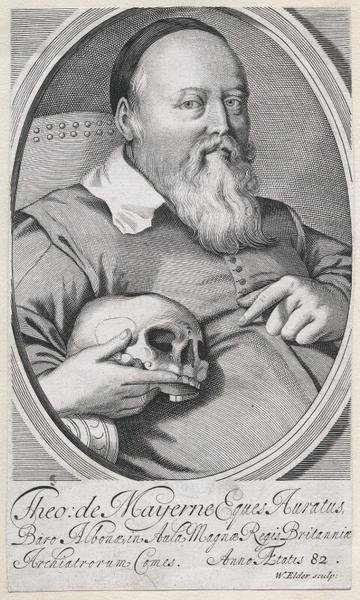
Illustration: Theodore de Mayerne by W. Elder, after Unknown artist, late 17th c.
In May 1665, Sir Theodore de Vaux was proposed (by John Wilkins), elected, and finally admitted to the Royal Society. Physician to Charles II and recently elected honorary fellow of the Royal College of Physicians, De Vaux was doubtless a prestigious catch and also proved an active member. But he was also the godson of Theodore de Mayerne (1573-1655), the celebrated paracelsian and physician to the Stuart kings,and in possession of a substantial amount of documents written by, or sent to, his deceased godfather. Keen to contribute, in the week following his admission De Vaux brought in a paper “concerning worms bred in the teeth of men.” Participants chipped in with anecdotal corroboration: Croone assured he had “likewise heard of worms taken out of the teeth”; Moray had also heard of “the like of worms taken out of the gums of a man in Scotland.” Later, De Vaux returned with yet another account ”of an aged woman, named Sarah Hastings, who had taken worms out of the teeth, gums, tongue, throat and face of several persons.”
For the coming years, the worms-in-teeth case stories were supplemented by an assortment of miscellanous documents from the same source, including “a Latin paper […] relating to the preserving of timber”; “a relation of a furred robe, made of the skin of the Tartarian boramez, supposed to be a plant animal,” “a paper […] concerning the nature of craw-fish,” and a document relating what “happened to one Mr. JOHN STEVENSON, who swallowed a bodkin.” “Several papers about sugar” offered an occasion to remind those “engaged in the bringing in of the histories of trade, be mindful of their engagements,” and a paper about “soap-making” was “delivered to Mr. HOOKE who undertook to give an account of that trade," and so on. Eleven years later, in 1679, De Vaux still brought in “receipts, which had been experimented by Sir THEODORE MAYERNE for making of ales of several sorts.”
(Read the full article on the NOTCOM ERC Project Website)
'The Observatory' is a series of blog entries about anecdotes, conflicts and controversies that shaped the history of sciences and philosophy, published by the NOTCOM researchers.
NOTCOM is a five-year research project in the history of philosophy of science funded by an ERC Advanced Grant in 2023-2027. It is dedicated to the epistemology, methods, and communication strategies of collective science in the seventeenth century.
Home to a team of senior researchers, post-doctoral fellows, post-graduate students, research engineers, and project managers, NOTCOM establishes a unique and innovative research environment between two units of the French National Centre for Scientific Research (CNRS) in Lyon and in Oxford.